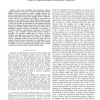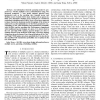136
click to vote
TON
2010
14 years 8 months ago
2010
We study the contention/interaction among wireless nodes and med -ium access control design in game theory framework. We define a general class of games, called random access game...
127
click to vote
TMC
2011
14 years 9 months ago
2011
— This paper establishes the equivalence between cognitive medium access and the competitive multi-armed bandit problem. First, the scenario in which a single cognitive user wish...
111
click to vote
SAC
2008
ACM
15 years 1 months ago
2008
ACM
The weakly pulse-coupled oscillator framework has proven to be a valuable resource for the development of peer-to-peer synchronization algorithms [9]. But leveraging it in a pract...
126
click to vote
TWC
2008
15 years 1 months ago
2008
Abstract-- An information theoretic queueing model is proposed in a wireless multiple access communication setup. The proposed symmetric N user model captures physical layer parame...
115
click to vote
ADHOC
2007
15 years 2 months ago
2007
We propose a novel approach to QoS for real-time traffic over wireless mesh networks, in which application layer characteristics are exploited or shaped in the design of medium ac...
133
click to vote
WCNC
2010
IEEE
15 years 6 months ago
2010
IEEE
—In the context of vehicular safety and entertainment applications, we focus on the design of a reliable medium access control scheme. Each vehicle is willing to form a network a...
VTC
2006
IEEE
15 years 8 months ago
2006
IEEE
—Today, many network applications require shorter react time. Robotic field is an excellent example of these needs: robot react time has a direct effect on its task’s complexit...
122
click to vote
GLOBECOM
2007
IEEE
15 years 8 months ago
2007
IEEE
Abstract— A distributed medium access control (MAC) algorithm for uplink OFDMA networks under the IEEE 802.16 framework is proposed and analyzed in this work. We present a simple...
105
click to vote
WMCSA
2009
IEEE
15 years 8 months ago
2009
IEEE
The increasing reliance of users on wireless networks for Internet connectivity has posed two significant challenges for mobile networking research. The first challenge is to pr...
117
click to vote
SAINT
2009
IEEE
15 years 8 months ago
2009
IEEE
The many-to-one multihop traffic pattern of Wireless Sensor Networks (WSN) puts a great challenge on enhancing the event-to-sink data delivery throughput. Because, in CSMA/CA dri...


